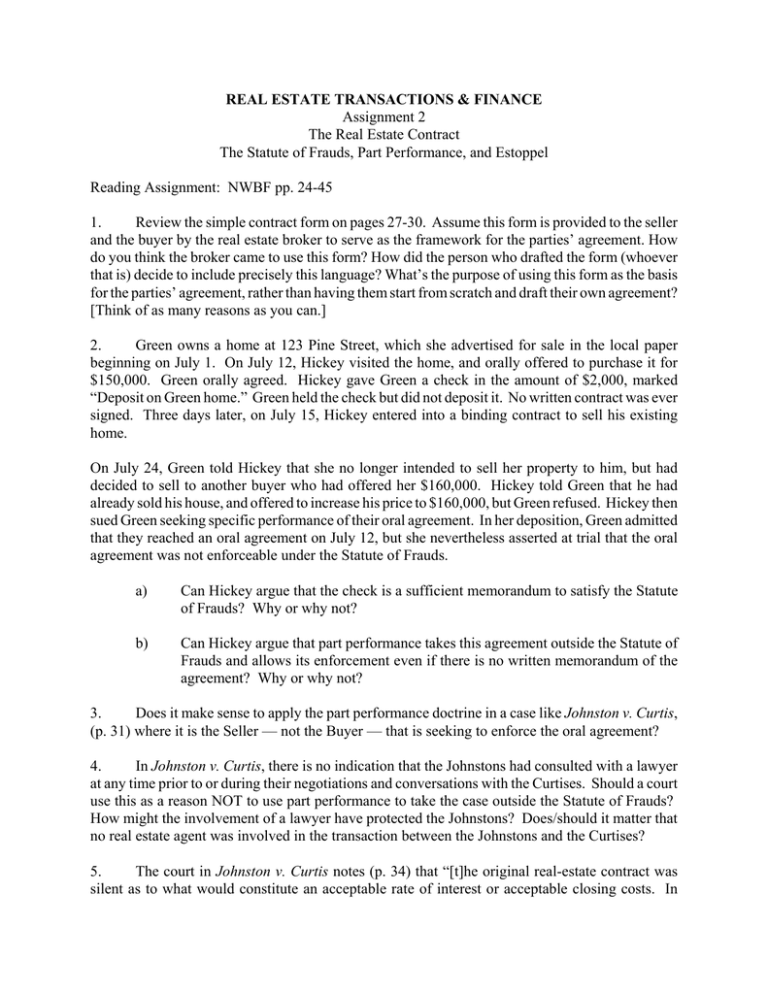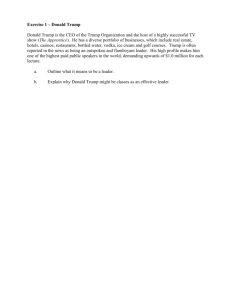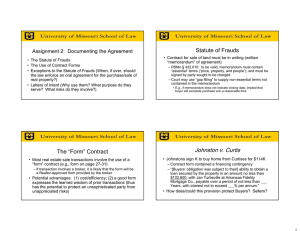REAL ESTATE TRANSACTIONS & FINANCE Assignment 2 The Real Estate Contract
advertisement

REAL ESTATE TRANSACTIONS & FINANCE Assignment 2 The Real Estate Contract The Statute of Frauds, Part Performance, and Estoppel Reading Assignment: NWBF pp. 24-45 1. Review the simple contract form on pages 27-30. Assume this form is provided to the seller and the buyer by the real estate broker to serve as the framework for the parties’ agreement. How do you think the broker came to use this form? How did the person who drafted the form (whoever that is) decide to include precisely this language? What’s the purpose of using this form as the basis for the parties’ agreement, rather than having them start from scratch and draft their own agreement? [Think of as many reasons as you can.] 2. Green owns a home at 123 Pine Street, which she advertised for sale in the local paper beginning on July 1. On July 12, Hickey visited the home, and orally offered to purchase it for $150,000. Green orally agreed. Hickey gave Green a check in the amount of $2,000, marked “Deposit on Green home.” Green held the check but did not deposit it. No written contract was ever signed. Three days later, on July 15, Hickey entered into a binding contract to sell his existing home. On July 24, Green told Hickey that she no longer intended to sell her property to him, but had decided to sell to another buyer who had offered her $160,000. Hickey told Green that he had already sold his house, and offered to increase his price to $160,000, but Green refused. Hickey then sued Green seeking specific performance of their oral agreement. In her deposition, Green admitted that they reached an oral agreement on July 12, but she nevertheless asserted at trial that the oral agreement was not enforceable under the Statute of Frauds. a) Can Hickey argue that the check is a sufficient memorandum to satisfy the Statute of Frauds? Why or why not? b) Can Hickey argue that part performance takes this agreement outside the Statute of Frauds and allows its enforcement even if there is no written memorandum of the agreement? Why or why not? 3. Does it make sense to apply the part performance doctrine in a case like Johnston v. Curtis, (p. 31) where it is the Seller — not the Buyer — that is seeking to enforce the oral agreement? 4. In Johnston v. Curtis, there is no indication that the Johnstons had consulted with a lawyer at any time prior to or during their negotiations and conversations with the Curtises. Should a court use this as a reason NOT to use part performance to take the case outside the Statute of Frauds? How might the involvement of a lawyer have protected the Johnstons? Does/should it matter that no real estate agent was involved in the transaction between the Johnstons and the Curtises? 5. The court in Johnston v. Curtis notes (p. 34) that “[t]he original real-estate contract was silent as to what would constitute an acceptable rate of interest or acceptable closing costs. In addition, Turbeville [the mortgage company’s loan officer] testified that the Johnstons did not discuss with her what interest rate or amount of closing costs would be acceptable to them.” In light of these statements, do you think that the agreement provides all of the essential terms necessary to satisfy the Statute of Frauds? Why or why not? 6. Trump owns a small microbrewery located on 7 acres of land, with a production facility, a refrigerated warehouse facility, a small gift/retail store, and a tap room. Buffett approaches Trump about the possibility of purchasing the microbrewery at a price of $3.2 million. After a brief discussion, Buffett sent Trump the following “Letter of Intent,” which Trump accepted by signature five days later: LETTER OF INTENT Date: August 10, 2015 Donald Trump 74A Trump Tower 25 Combover Drive Miami, FL 33101 Re: Trump Craft Brewery Dear Mr. Trump: The following is to serve as a Letter of Intent to acquire from you that certain Property located at 278 Peachtree St., Atlanta, GA 30301, along with the improvements, fixtures, furnishings, and business equipment located thereon, otherwise known as “Trump Craft Brewery.” 1. Buyer. Warren Buffett 2. Seller. Donald Trump 3. Purchase Price. Purchase price shall be the sum of Three Million Two Hundred Thousand Dollars ($3,200,000.00), which shall be payable: 4. a. Three hundred twenty thousand dollars ($320,000) cash deposit to be deposited with an escrow agent, selected by Buyer, said deposit to be deposited in an interestbearing account, interest accruing to the benefit of the Buyer. Said deposit to be paid upon execution of a formal Contract to Purchase, executed by both parties. b. Two million, eight hundred and eighty thousand dollars ($2,880,000) payable in cash at closing. Acceptance of Letter of Intent. Seller shall have until August 20, 2015 to accept this Letter of Intent by delivering written notice of acceptance to Buyer by said date at 312 Lincoln Avenue, Omaha, NE 68022. 5. Contract of Sale. Within ten (10) days of Seller’s acceptance of this Letter of Intent, the parties will enter into a contract embodying the terms of this Letter of Intent, and such other provisions as the parties and/or their counsel deem necessary or appropriate. 6. Rights of Inspection. Seller shall furnish Buyer upon execution of the Contract of Sale, copies of any mortgages or liens encumbering the subject property, copies of all leases and contracts pertaining to the property, a current survey, and profit and loss operating statements relative to the property for the years 2012-2014. Buyer shall have twenty (20) business days from the date of delivery of said documents to review the same. In addition, Buyer shall have twenty (20) business days from the date of execution of the Contract of Sale within which to inspect the property and all improvements thereon. If the Seller is not notified in writing prior to the termination of the twenty (20) business day period that Buyer wishes to terminate the Contract of Sale, the earnest money deposit will be forfeited to Seller and will be nonrefundable. 7. Closing. Closing with respect to the sale will take place on or before October 31, 2015. 8. Formal Agreement. The provisions of this Letter of Intent are subject to the execution of a formal agreement by the parties within a specified time in Paragraph 5 above and this Letter of Intent shall not be binding on Buyer or Seller until complete execution of such Purchase and Sale Agreement by the parties, which Purchase and Sale Agreement shall embody the above provisions and contain acceptable covenants and agreements regarding title, survey, closing procedures and expenses, notice, remedies, and such other items as may be deemed necessary or appropriate. Please confirm that the foregoing is acceptable to you so that we may proceed to prepare a formal Purchase and Sale Agreement for your submission and review. Sincerely, Warren Buffett Accepted: Donald Trump Date: August 15, 2015 On August 20, 2015, Trump entered into a binding contract of sale to sell Trump Craft Brewery to Jay-Z for a price of $4 million, and advised Buffett that he “no longer intended to pursue the negotiations reflected in your letter of intent of August 10, 2015.” Buffett wants you to bring an action against Trump and Jay-Z on the ground that Trump was contractually obligated to sell the property at the agreed price of $3.2 million, and to obtain either the property itself or the $800,000 extra that Jay-Z agreed to pay for the property. Is there a binding agreement between Trump and Buffett capable of enforcement? What is the impact of ¶ 8 of the “Letter of Intent” on your analysis?







